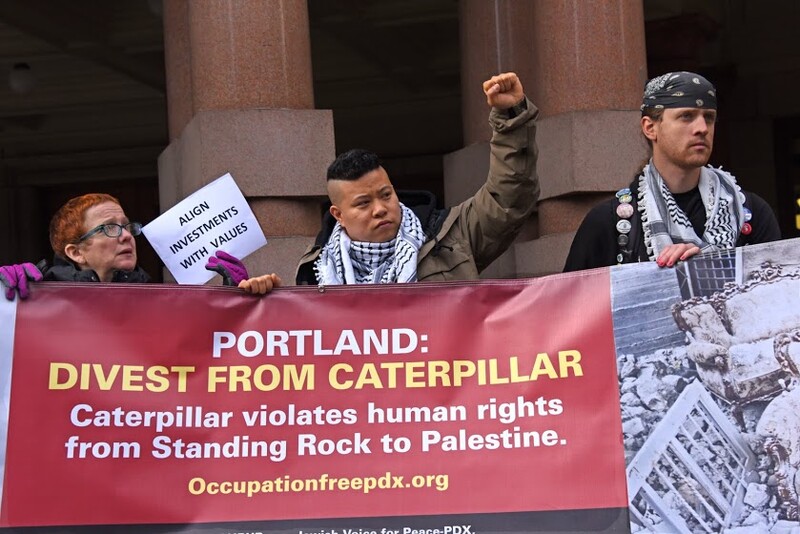Activism and BDS Beat 13 April 2017

Portland activists pressed for the city to end investment in companies that aid human rights violations, including Caterpillar. (via Facebook)
Portland, Oregon, has voted to divest all city funds from corporations, in a move that is being greeted with a mixture of praise and disappointment from activists who have been pushing for a socially responsible investment policy for years.
The 5 April city council vote came after the city worked for more than two years to create a mechanism to ensure that it does not invest in corporations that are complicit in a range of abuses.
The grassroots divestment push began four years ago, when a coalition of activists came together to campaign against city investments in Wells Fargo bank and Caterpillar, corporations involved in the private prison industry and human rights abuses of Palestinians.
In December 2014, the city created the Socially Responsible Investments Committee, which was tasked with devising a “do not buy” list of corporations.
Last September, the committee published its first report, naming nine companies whose practices violate environmental, health, labor, business or human rights standards.
The report specifically cited Caterpillar’s “practice of selling custom weaponized military equipment and its involvement in human rights controversies, including direct maintenance and support of Israeli military bulldozers during attacks on Palestinian residences, orchards and other property.”
Blanket ban
But what began as a rigorous process to determine which corporations should be placed on a “do not buy” list, ended last week with a blanket prohibition on investing in any company.
Last week’s vote overcame top city officials’ attempts to continue investing in companies they see as crucial revenue streams for the city.
“This is a win,” Hyung Nam, a member of the Socially Responsible Investments Committee, told media. “The city is actually willing to lose money to their budget because they want to get out of these big corporate nightmares.”
But others regret that by imposing a blanket ban on corporate investments, the city avoids rebuking the most egregious bad actors.
“We thought it was important for the city to specifically call out corporations for violating socially responsible criteria,” Rod Such told The Electronic Intifada.
Such, a member of the Occupation-Free Portland coalition and a regular contributor to The Electronic Intifada, said there was “a little disappointment” among the broad coalition of groups that had worked for divestment.
“Behind the scenes”
Such believes that part of the motivation to impose the blanket ban was to avoid dealing with a new campaign every year, with a new corporate target.
He also fears that some city officials wanted to avoid denouncing corporations like Caterpillar, whose equipment Israel uses as weapons against Palestinians.
“The goal was to get someone on the city council to openly make a public statement condemning Caterpillar’s role in the occupation,” Such said. “Even the most progressive member of the city council said, ‘I won’t go there.’”
“In one sense our goal was to get the city to stop investing in Caterpillar. In that sense we won,” Such said. “But in the large political sense, we didn’t win. But I think we got a step closer.”
According to Such, the Jewish Federation of Portland and the Israeli government-funded group StandWithUs testified against listing Caterpillar on the do not buy list.
The Jewish Federation says it also went into action “behind the scenes – and quietly” to defend several other companies involved in Israel’s occupation – Hewlett-Packard, G4S and Motorola.
“Victory for citizen activism”
In December 2016, the city council decided to suspend all corporate investments until the city treasury reassessed the investment policy.
At the 5 April city council meeting, Portland Mayor Ted Wheeler proposed scrapping the city’s own do not buy list and instead deferring to a New York-based ratings firm that helps identify responsible companies for city investments.
Wheeler argued that the city could not afford the loss in revenue from moving all of its investments out of corporations.
The city treasurer estimates it will cost an annual $3-5 million dollars. About one-third of Portland’s $1.7 billion investment portfolio is currently in corporate bonds and securities.
Wheeler also said he was generally against divestment, because “he sees it as a lost opportunity to influence corporations from the inside,” according to a local report.
But city commissioner Dan Saltzman argued for an outright ban on corporate investments.
“I think it’s the wiser course to get out of the business altogether, because I don’t really want to have to do this once or twice a year, and have the same discussion over 21 companies,” Saltzman said.
In casting her vote with Saltzman, city commissioner Chloe Eudaly said, “I can’t dismiss the symbolism and meaning of Portland taking a stand on these issues.”
“This decision is a huge victory for citizen activism,” Maxine Fookson, of Jewish Voice for Peace and Occupation-Free Portland, said in a press release.
Fookson added that although activists would have preferred the city to keep its socially responsible investment policy, the decision to pull all corporate investments “at least ensures that our tax money will not be complicit in human rights violations in Israel/Palestine and elsewhere.”





